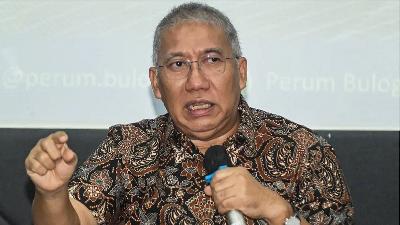The Spread of Illegal Rice Levies
Monday, March 4, 2024
Illegal levies are worsening the shortages of subsidized rice. Price rises are caused by, among other things, corruption.
arsip tempo : 174648131741.

THE government does not pay enough attention to the serious matter of rice supplies and distribution. As a result, stocks are often low, and prices rise because of the actions of a small number of people trying to make a profit for themselves and their groups. The recent rises in the price of rice are caused by, among other things, an imbalance between supply and consumption, which is a result of illegal levies from the setting of supply quotas at the warehouses of the State Logistics Agency (Bulog).
Illegal levies lead to more shortages of rice in markets. Traders are reluctant to take government rice reserves from Bulog warehouses because they have to pay illegal levies to the managers of trade associations. Meanwhile, traders who are not registered as members of these associations find it difficult to obtain rice. Illegal levies stop the distribution of rice.
Bulog used to send rice directly to markets and consumers. Now the rice from the Food Supply and Price Stabilization (SPHP) program is sent out through distributors and large traders who own networks of shops. This scheme, as well as lengthening the rice supply chain to customers, creates opportunities for rent seekers at every stage.
An investigation by this magazine in a number of areas found that there are many machinations in the distribution of SPHP rice. Every trader who wants to take rice from a Bulog warehouse has to pay an additional fee per kilogram. In Indramayu, West Java, the tariff is Rp200 per kilogram, and the tariff for obtaining a rice supply quota is Rp250 per kilogram.
In West Kalimantan and Madura, West Java, the aroma of these practices is also apparent. Stocks of rice are low because traders have problems obtaining supplies from Bulog. As in other areas, even if they do obtain supplies, distributors and traders have to pay bribes. These additional costs lead to more expensive rice for consumers.
These rent seeking practices are actually a latent problem that Bulog should easily be able to check and prevent. The new Bulog Chief Executive Officer (CEO), Bayu Krisnamurthi, is an agricultural scientist from IPB University who understands the intricacies and the problems of rice distribution. He should be able to prevent this rent seeking quickly and completely.
The existence of these rent seekers appears to embarrass the National Food Agency, which claims that stocks of rice in Bulog warehouses still total 1.2 million tons, with 500,000 million tons being imported. The price of rice at Cipinang Rice Central Market, Jakarta, has started to fall. But illegal levies have slowed distribution. Rice is held up at warehouses, meaning it is still scarce and expensive in markets.
This disarray over rice distribution must be ended. Rent seekers and corrupt people must be prosecuted because they are disrupting people’s lives. Rice is a basic requirement for Indonesian people. Any shortages will trigger inflation, which will in turn have an effect on the economy as a whole. Rice distribution handled by people who lack integrity could lead to a serious social crisis.











